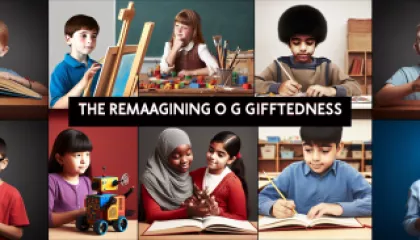Rethinking Giftedness: Beyond IQ Scores and Stereotypes
Giftedness is a concept that has been debated and redefined over the years, often being equated with high intelligence quotient (IQ) scores, academic prowess, or prodigious talents. However, in my opinion, this traditional view of giftedness is too narrow and fails to capture the full range of human potential. In this article, I will explain why we need to rethink our understanding of giftedness, moving beyond IQ scores and stereotypes.
The Limitations of IQ Scores
IQ tests have long been used as a primary measure of giftedness. They assess cognitive abilities such as logic, reasoning, and problem-solving skills, which are undoubtedly important. But they fall short in recognizing other forms of intelligence that are equally valuable.
IQ tests predominantly measure what psychologist Howard Gardner refers to as logical-mathematical and linguistic intelligences. Yet, Gardner's theory of multiple intelligences proposes at least seven other types of intelligence, including musical, spatial, bodily-kinesthetic, interpersonal, intrapersonal, naturalistic, and existential.
By focusing on a limited set of abilities, we risk overlooking children who excel in these other areas but may not perform well in traditional academic settings or on IQ tests. Therefore, it's essential that we broaden our definition of giftedness to include these different intelligences.
Stereotypes and the 'Gifted' Label
Beyond IQ scores, stereotypes play a significant role in our perception of giftedness. The 'gifted' label is often associated with images of straight-A students, child prodigies, or introverted geniuses. However, these stereotypes can be misleading and even harmful.
Firstly, not all gifted individuals excel academically. Some may struggle in school due to learning differences or a mismatch between their learning style and traditional teaching methods. Others may underperform due to lack of motivation or because they're bored with the pace of regular classes.
Secondly, gifted individuals are not a homogenous group. They come from diverse backgrounds, have varied interests, and display a wide range of personality traits. By reinforcing stereotypes, we risk creating unrealistic expectations and putting undue pressure on these individuals to conform to a certain mold.
A Holistic Approach to Giftedness
Given the shortcomings of IQ scores and stereotypes, I believe we need a more holistic approach to identifying and nurturing giftedness—one that recognizes multiple forms of intelligence, acknowledges individual differences, and appreciates the complexity of human potential.
This approach would involve looking beyond academic performance and test scores to consider a child's creativity, curiosity, persistence, and passion for learning. It would recognize that giftedness can manifest in different ways, at different times, and in different contexts.
Moreover, it would focus on providing an encouraging and stimulating environment for all children to explore their interests, develop their talents, and reach their full potential, rather than segregating 'gifted' students based on narrow criteria.
Conclusion
To conclude, rethinking our understanding of giftedness involves moving beyond IQ scores and stereotypes. It involves acknowledging the diversity and complexity of human potential and adopting a more inclusive and holistic view of giftedness.
We need to create environments where all forms of intelligence are valued, where individual differences are celebrated, and where every child is given the opportunity to shine. Only then can we ensure that no talent is overlooked, and every child's potential is fully realized.
So let's rethink giftedness. Let's broaden our horizons and see the potential in every child. Let's acknowledge that being gifted is about more than an IQ score or a stereotype. It's about the full spectrum of abilities, talents, and potentials that make each of us unique.






